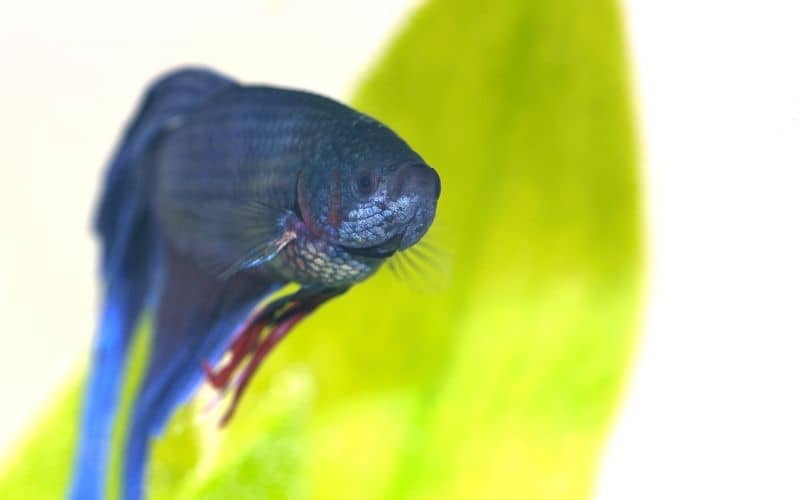You may find it silly to keep checking betta fish poop regularly. But constant inspection of poop can help you find any diseases your betta fish has, and poop is the first matter you should care about.
Just like us human beings, Betta fish also have a gastrointestinal system. Pooping is considered the only way to remove food waste from their body. Healthy bettas usually have regular bowel moments while others have abnormal-sized odd-colored poop.
The Siamese fighting fish, known as Betta fish is first discovered in paddy fields in Southeast Asia. Bettas are a labyrinth fish that can survive for short periods of time out of water. Bettas can live in small spaces and with low-quality water.

However, they do best in small aquariums of at least two gallons and regular water changes. Bettas have upturned mouths to feed on the water’s surface. They need a diet high in protein and fiber to survive. An excellent combination of food diets is dried bloodworms,
Commercial betta food consists of all the nutrition they need. Feeding with commercial betta food improves the brilliant coloring and longevity of betta fish. Although Bettas can adapt to low water qualities, they prefer slightly acidic (pH 6.5 to 7) and warm (76-82 degrees F) water.
Do Betta Fish Poop?
Jump To
- 1 Do Betta Fish Poop?
- 2 How Often Do Betta Fish Poop?
- 3 Is It Normal For Fish To Have Long feces?
- 4 How To Clean feces from betta fish tank
- 5 What Does A Betta feces Look Like
- 6 What Color Should normal Betta fish feces Be?
- 7 Betta Poop Red – Should You Concern About Red Betta feces?
- 8 Betta Poop White
- 9 Fish Poop Black
- 10 Betta Fish Yellow feces
- 11 Betta Parasite feces
- 12 Betta fish Stringy feces
- 13 What Can I Predict From Betta Fish feces Color
- 14 Betta Fish feces White Stringy
- 15 Why Betta Fish Not Pooping
- 16 How Do You Fix A Constipated Betta Fish? (How To Help A Constipated Betta)
- 17 Can A Betta Die From Constipation?
- 18 How To Make A Betta Fish Poo
- 19 Do Betta poo Out Of Their Mouths?
- 20 Do Betta poo Blood
- 21 Does Betta fish feces Float
Yes. they do. Like everyone else, Betta fish also have a bladder system that makes it essential to poop to eliminate food waste. They have a small opening in front of the anal fin to relieve. As they are too small, you may not notice them at all. Many bettas go to private places to poop. The only sure-find way of finding out bettas poop is noticing poop waste on the bottom of your tank. They may look like uneaten food but don’t worry. They are betta feces piled up in days.
How Often Do Betta Fish Poop?
When you feed betta fish regularly in small quantities, they will poop regularly. If they refuse to eat food, are constipated, or sick, betta fish bowel movements’ persistence may change.
As their stomach is too small, you only need to feed 2 to 4 pellets per day. If you feed more than that, they will have digestive problems.
Normal betta poop are brown or tan in color, round, and relatively small. They may also have a tint of red color because of food coloring. You may sometimes mistake them for leftover foods.
Is It Normal For Fish To Have Long feces?
Long poops are normal if they are in their usual color and fall after a minute or two. If the poo is hanging out in the anus for longer than several minutes and the color is odd, the fish may be sick.
When you see long poop hanging from its body, you should observe your fish more closely. While longer poop is normal for many fish, a color change can explain which illness they may have. Some recommend fasting fish for a day or two to get rid of long poop; however, some illnesses need food to recover.
So, you should see a veterinarian if you see any abnormal colored long poop.
How To Clean feces from betta fish tank
One way to clean feces is to clean the tank. Cleaning the tank is a long process that will take time, and you should be careful not to remove betta fish from the tank in the whole process. The quick solution is using a gravel vacuum. Vacuuming the sand works quite well if it is done regularly.
Using an air stone or a power head would be another brilliant solution. These gears will blow and stir the sand, which has more debris. The fish’s waste keeps floating because of the current they produce. Then the filter sucks the waste to keep the tank clean.
you can find more about betta fish care in here.
What Does A Betta feces Look Like
Normal betta fish poo looks round and brown or tan. If you detect white or yellow poop, take the fish to the vet as yellow and white poops are a sign of sick fish.
What Color Should normal Betta fish feces Be?
The feces can be brown, tan, yellow, or white. Brown and tan colors are considered healthy fish poop, while white and yellow poops observe unhealthy fish. Sometimes, feces can have shades of red color due to food colorings.
Betta Poop Red – Should You Concern About Red Betta feces?
No and Yes. Sometimes betta fish poops have a tint of red color if they eat solid commercial betta food. Commercial food is made with food colorings, and bettas digestive system doesn’t absorb the color. The colorings leave Bettas body through feces; hence they get red color markings. However, if you see more than one string of red color poop hanging in the anus, that is because of Camallanus Worms. You should consult a veterinarian in that case.
Betta Poop White
You should be concerned when your Bettas poop in white color. Long, white and stringy poo may be a sign of intestinal parasites. Although it is rare among fish bred in captivity, you may find it easy to detect parasitic long white poop.
Parasite-infected white poops imitate dancing against the water current. That is a clear sign of infected worms. If the poops are thin, stringy, and white, that is due to starvation.
Your fish may have had no food over the past few days and may not have anything to digest. This starving may be due to an illness or maybe because it is bored with the same food. Check if changing the food increase git’s appetite or else show it to the veterinarian.
Fish Poop Black
Black color poop is usually not a matter of concern. The food you offer can be a primary factor in changing the color of feces. Depending on the food, betta fish poo can be tan, brown, reddish, or black.
Betta Fish Yellow feces
Betta fish poops in yellow color if they are constipated or have other digestive distress or a parasitic infection like Camallanus worms. Yellow poop is a clear sign that your fish is sick. Try feeding veggies like peeled green peas first.
If that doesn’t treat the problem, you’ll have to feed them anti-parasite food.
Betta Parasite feces
Parasite poop looks white or yellow and sometimes in red (like a pom-pom.) If you happen to see stringy, long poop that stays in the anus for more than two to three minutes and they are yellow, white, or red-colored, it’s better to take your betta fish to a veterinarian.
Betta fish Stringy feces
The expected healthy poop color is tan or brown. Yellow, white or red color poops are abnormal or discolored. It’s better to observe your fish if they poop discolored poops. Stringy poop is an absolute fact that your betta fish is sick.
What Can I Predict From Betta Fish feces Color
Their poop is the first odd thing you’ll see in a sick fish. When your fish is sick, it’ll poop in odd colors. If left untreated, you may lose your pet. So, checking on poop is vital in keeping them.
Read more Why Betta Fins Shredded Overnight? [SOLVED]
Betta Fish feces White Stringy
White, thin, and stringy poop reveals the starvation . They may have lost appetite. Change the food and see if they eat different food. If not, that’s a thing to be concerned. White, long, and stringy poop indicates intestinal parasites.
Why Betta Fish Not Pooping
It doesn’t poo when they suffer from constipation. Other symptoms of constipation are a bloated stomach and lethargy. This constipation occurs when you overfeed your betta fish. Betts only need about four pellets maximum per day. Their gastrointestinal system is the size of their eye, so they need lesser food.
Due to their natural instincts, they tend to eat as much as they find in their environment. So, if you feed more, they will eat all of them. Eating more food will upset their digestive system and cause constipation.
How Do You Fix A Constipated Betta Fish? (How To Help A Constipated Betta)
Follow these steps to help heal the constipation of fish.
- Ensure keeping water temperature between 76-81 Fahrenheit.
- Don’t feed your betta fish for up to 3 days, and check when it poops.
- Place another betta fish or a mirror to encourage your betta fish to flare. They often poop when flaring.
- If the above steps don’t help, try feeding them peeled green peas. It should poop within 24 hours.
- If your betta fish refuses green peas, try feeding it thawed Daphnia.
You can feed peeled green peas once every week to avoid constipation.
Can A Betta Die From Constipation?
Although constipation is common in them, it is not a fatal disease. However, constipation’s side effects lead to more health problems that can be fatal to your pet. Prevention of constipation by providing a balanced and varied diet is the better solution. Sometimes constipation may lead to dropsy.
How To Make A Betta Fish Poo
If you have a picky one that refuses food often, try feeding them live foods such as brine shrimp or freeze-dried foods such as bloodworms. But, if you have a constipated betta try the steps given above. If they eat balanced food in smaller quantities daily, they usually don’t get constipated.
A healthier digestive system ensures regular betta fish poop.
Do Betta poo Out Of Their Mouths?
Betta fish poop from their butt, not from their mouth. If they spit out anything from their mouth, they are inedible things they explore while swimming. For example, they eat sand and shell bits finding they are interesting enough to eat. And then they realize that sand and eggshells are not edible. So, they spit them out.
Do Betta poo Blood
They may poo bloody mucus. But, it is rare and can be fatal. Coccidia, a parasitic infection, is the possible cause of bloody stools of betta fish. If you find your fish poop has blood, go to a vet immediately.
Does Betta fish feces Float
Normal poop should sink to the bottom of the tank. If feces floats, it may be due to an intestinal parasite infection. Another possible cause is a high protein diet in betta fish.
Read more Elephant Ear Betta Care Complete Guide 2020 [Update]
